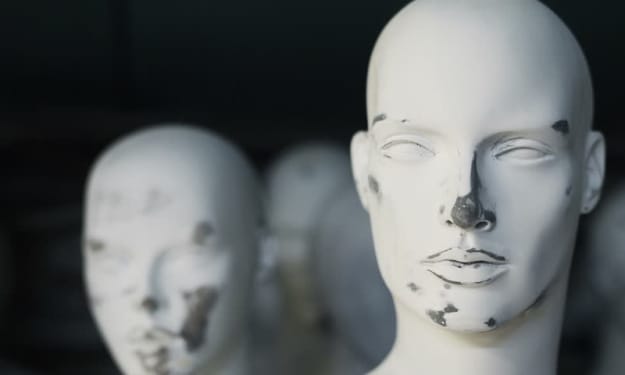
Sleep paralysis is only now becoming recognized.
When I was about 18 I started to notice something disturbing happening to me. I would wake up, but not. My eyes would open and dart around the room, but my head would lay lifeless and weighed down. I’d try to sit up, move a finger, cry out for help but nothing would happen. I was paralyzed. The first few times is terrifying, and since then they have remained terrifying. In fact according to the DSM-4, symptoms include “dread,” and “a fear of impending death.” Eventually, I slowly start to “break” out of it, but it requires an enormous draining effort to do so. My right foot is always the first to move and often is never paralyzed. Anyone I’ve shared my bed with as an adult knows if my legs start to go apeshit wake me up.
In 2005, I took an abnormal psych class and found the answer to what was happening to me. It was less than five lines in the DSM-4. Classified as a sleep disorder, parasomnia/otherwise not specified.
I had seen a doctor who told me, “you are just dreaming.” To someone who suffers from sleep paralysis this is extremely insulting. It’s not a dream, I can hear and see and recite conversations happening on TV or in the next room. Although, twelve years ago, a lot less was known about this disorder. It’s happening and you are not alone.

What is sleep paralysis?
The easiest way to explain it is this: When you sleep and dream your body paralyzes you so that you won’t act out your dreams. Sleepwalkers aren’t paralyzed enough, while people with sleep paralysis are paralyzed too much. When waking from a dream state, your mind simply wakes before your body.

What causes sleep paralysis?
This is still unclear, but there are some ways to predict an attack and people who are more prone to it. Anyone can experience it. It feels like being buried alive, only your body is your casket. This isn’t the same as those who suffer from chronic sleep paralysis, but it can affect anyone.
- It usually starts at puberty and increases in likelihood as you get older.
- I have always had trouble sleeping and staying asleep; an unsteady sleep schedule causes attacks to increase.
- Not enough exercise and too much caffeine can also cause it to occur more often.
- Stress is a key component in the frequency of sleep paralysis.
- Also if you find yourself dreaming very quickly after falling asleep, it’s a sign your sleep cycles aren’t happening in the proper timing and can cause an attack.

What About Hallucinations?
Many of our culture's boogeymen have been attributed to sleep paralysis. Hallucinations while experiencing sleep paralysis does happen. I myself have a hallucination maybe one out of a hundred times. I experience sleep paralysis about once or twice a week. So that’s about once every two years, however, it’s still scary as hell.
I see shadow people, a silhouette of evaporating black smoke shaped like a man meaning to hurt me. The worst is when he walks out of view and I felt the bed shift. I remind myself that it’s not supernatural. It’s a trick of the brain and I go back to digging my way out of it.
I also hear invisible children running right up to my bedside. It’s a less mentioned fact that while you are dreaming in REM sleep, your eardrums vibrate and can recreate noises you hear in your waking life.
Shadow people are the most common and have become part of our culture's lore. I wrote a fiction novel where sleep paralysis and the shadow man are the story's main antagonist. Other novels, such as the John Dies At The End trilogy By David Wong, explore the origins of shadow people.
Other boogeymen that could be born of sleep paralysis include
- Demons
- Succubi or “Old Hag” Syndrome
- Aliens and Alien abductions
Many of their sightings could just be a sleep paralysis hallucination and imaginations run wild. A YouTube search will provide you with many people who are convinced these beings cause sleep paralysis and not the other way around.
How can you stop it?
Bad news folks, you can’t. There's no proven medication and a diagnosis other than “you’re dreaming” is still hard to come by. This year I failed a physical because the doctor didn’t know what it was and ordered a sleep study. Not because she thought it was dangerous, but because she had never heard of it. Her office was directly below the area’s only sleep disorder specialist and yet hadn’t a clue what it was. So although not much is known, it is becoming more common and being slowly accepted. Some have suggested a link between opiate abuse and sleep paralysis.
Medication: although it’s off-label, use of these drugs Prozac and Adderall have shown promise in stopping sleep paralysis.
Other ways to decrease attacks.
- Exercise
- A regular sleep schedule
- Try not to stress before bed
- No caffeine before sleeping
Also, for what it’s worth, I noticed after a bout of sleep paralysis the back of my head would be numb like it had fallen asleep. I told my partner if she suspects, an attack to lift my head off the pillow. For whatever reason, it works when just saying my name and shaking me doesn’t. Although, a lifeless head is a lot heavier than you’d think.
I hope this has been helpful, and we need more open dialogue about this disorder for it to be more known and study. There are lots of sleep studies that pay patients with particular disorders to participate. Advance science and get paid; not bad for a good night's sleep.
Turn the lights on, it’s gonna be alright. Even if the shadow man is coming, a little light can send him packing.
About the Creator
Ray Bohn
Aspiring writer and Octonaut.
Author of horror novels "Pray For Punks" and "Slaughtering Shadows and Other Things I Thought Were Shadows". Available now in paperback and kindle at Amazon.com






Comments
There are no comments for this story
Be the first to respond and start the conversation.